QuestionQUESTION: Hello,
I have an 18 month old male, neutered beagle. I have had him since he was 8 weeks old. I am currently fostering, with the intention of adopting, an 18 month old, neutered Golden Retriever. The beagle is showing signs of dominance towards the more submissive golden (which I recognize as normal. He puts the golden in what looks like a neck lock/hug and with hackles up is growling and not allowing the golden to move. My issue is when this behavior shows during "play" time. When any toys are involved the beagle re-acts harshly with a this is mine, get away from it growl, and snaps. This is towards the golden only, I can still remove the toy w/o problem. The golden has been in our lives for just a matter of days, however I want to end this behavior, as of now I can not allow them to hang out w/o supervision. Thank you for your time!
ANSWER: Hackles raised can be dominance but it can also be fear. How long does this neck lock/hug last? What does the Beagle do when he lets go and how does the Golden respond? Apparently it is serious enough for you to be separating the dogs unless they are supervised; this is not the best approach as separation does not allow them to establish a relationship and it doesn't appear to be working since the Beagle is trophying his toys and apparently hasn't backed off his initial response (the neck lock/hug.) These dogs should have been introduced outdoors on neutral territory; it's never a good idea to bring another dog into the household without neutral social interaction unless you are clearly in charge and you are able to extinguish immediately (with verbal response) any behaviors you do not want in your resident dog. How well socialized is your Beagle to other dogs? What does he do outdoors if he sees another dog on leash? Has he had any positive reinforcement training, does he know any commands? Your Beagle may not be a candidate for another dog in the household. Please answer the questions I've asked, explain anything further you think might be pertinent, and I'll be more able to address the problem. Meanwhile, remove all the toys. Put the Golden on house leash (long lightweight nylon) and keep him near you (but do not give him any more attention than usual as you don't want to promote him, especially in sight of the Beagle.) Do not allow the neck lock/hug; without involving the Golden in any way, make a verbal correction toward the Beagle (growly "Nah!") Pet the Beagle first, feed him first, let him in/out first; but this is not the overall fix, it's merely establishing rank between them while letting the Beagle know that certain behaviors will not be tolerated by you. Repost with further info.
---------- FOLLOW-UP ----------
QUESTION: The neck hug/lock lasts about 20 seconds. If in this time the golden attempts to move the beagle growls more and the golden just lies thereon his tummy and allows it. The beagle is well socialized, dog parks, dog "friends", dog day care have all been apart of his routine. Thank you for the information about nuetral territory, I should have thought about that, I do not want to set them up for failure. If the beagle sees other dogs outside, he does not ignore or engage, a "passing intererest" seems most accurate, although there are times when the hackles go up, more in fear I would guess. There is never growling, or teeth shown etc. The beagle knows: sit, stay, down,leave it, wait (for in and out of doors, cars etc) and while he knows come, it can be a challenge under certain circumstances.
Can you explain further about "Do not allow the neck lock/hug; without involving the Golden in any way" I am not sure if I understand what you mean by involving.
AnswerThank you for explaining further. Since the neck hug/lock lasts such a short time, and the golden is not responding (but not showing submission by rolling over either), this is most likely the "problem." The Golden is (perhaps) not demonstrating a clear posture of submission. Your Beagle has obviously been well socialized to other dogs (kudos!) The fact that he responds with raised hackles to SOME passing dogs is more an indication of some signal he's perceiving (or misperceiving) from the passing dog. Without observing it I can't know this, it's merely a guess. Raised hackles CAN be a sign of dominance, and the fact that your dog apparently responds to commands (except recall, and it's a BEAGLE after all) makes me doubt the dominance factor. It's quite possible that the body language of the Golden is (without your knowledge) aggravating the Beagle's response. This is, again, something I can't really know without seeing it. If you don't have a good understanding of dog body language, I suggest you obtain one. Read Turid Rugaas' book on calming signals and anything else you can get that will help you to instantly read dog communication (ear set, tail set, whites in eyes, lip licking, shifting gaze, body posture, etc., sounds complicated but it isn't.) This will assist you in properly reading the Golden and perhaps further understanding your Beagle, as well. Meanwhile, what I meant by "do not involve the Golden" was: do not address the Golden, touch him, interact with him, or involve him when interfering with the Beagle. However, given what you've just told me, I think it best you leave well enough alone, UNLESS the Beagle's behavior escalates OR the Golden begins to offer behaviors that further antagonize the Beagle (by beginning to posture, growl, etc.) The Golden Retriever is a very bidable breed (normally); however, the male can be quite a handful and exhibit dominant behaviors toward other dogs (and occasionally toward humans, which is why the breed has suffered an aggression problem in the past 20 years.) Overbreeding, backyard breeding, etc., in this breed has produced some problematic dogs.
Put the Golden on house tab (as I earlier suggested) without showing any more attention toward him than you ordinarily would (so as not to promote him in the Beagle's perception.) This "umbilical cord" will give a clear signal to both dogs: that you are in charge. REWARD the Beagle's acceptance of the Golden when you clearly perceive it (but don't over do it, and be certain not to reward fear or dominance, so you really must be able to read the body language.) This situation should resolve itself as the Beagle and Golden become more accustomed to one another.
You mention that your Beagle has "obedience" training; you don't mention how you achieved it. I suggest (if you used coercion) that you switch over to positive reinforcement. This will work wonderfully for both dogs. As for your recall, most owners have blown the "come" command and a scent hound is an especially difficult breed to acquire a strong recall. Using another word (one the dog will never hear outside of this exercise, I usually suggest the word "presto"), introduce this word by walking to the Beagle, standing in front of him, holding the cheese over his nose so he goes into a sit posture, and as you pop the cheese into his mouth, say "Presto." Within approximately ten trials, your Beagle will connect the word "presto" with being seated in front of you for a piece of cheese. Once he's doing this routinely, take this exercise into other rooms; walk toward the dog, hold the cheese, as he approaches you and attempts a sit, say "presto", pop the cheese in his mouth, end the exercise. After a few days of this sporadic "game", try it from other rooms. Get his attention (so he's looking at you), assume your cheese posture, say "presto" and wait for the dog to come and sit in front of you. When he does this, give him a handful of cheese and end the exercise; repeat it again later. What you are aiming for is a SOLID RESPONSE, when the dog CLEARLY connects "presto" with reward and ALWAYS comes to sit in front of you. Once you've achieved this, play round robin recall with the Beagle outdoors. Bring small chunks of cheese (fat free); get the family in a circle (or friends) and "pass the dog around" by alternating "presto", with a cheese treat from everyone. This should solidify your recall; but beware how you use it. Recall should be saved for those moments when the dog ABSOLUTELY SHOULD COME TO YOU. If he's chasing down a scent, don't try to use it.

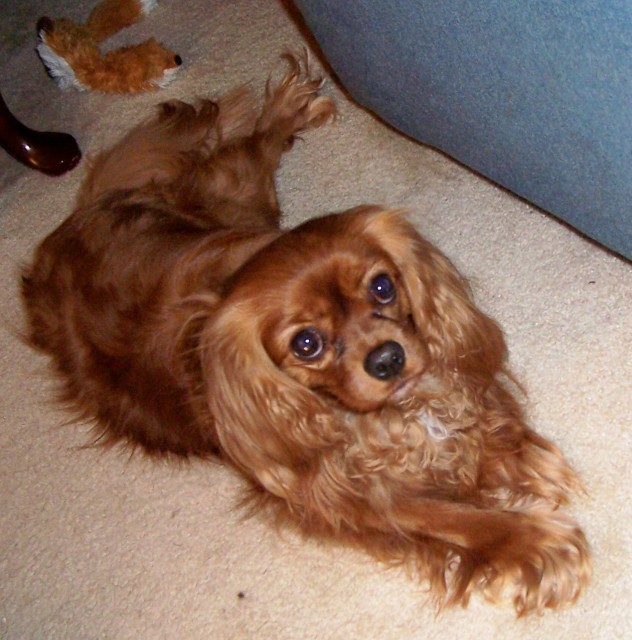 Dog light and shadow chasing
Question
Jenni
My 3 year old Cavalier King Charles Span
Dog light and shadow chasing
Question
Jenni
My 3 year old Cavalier King Charles Span
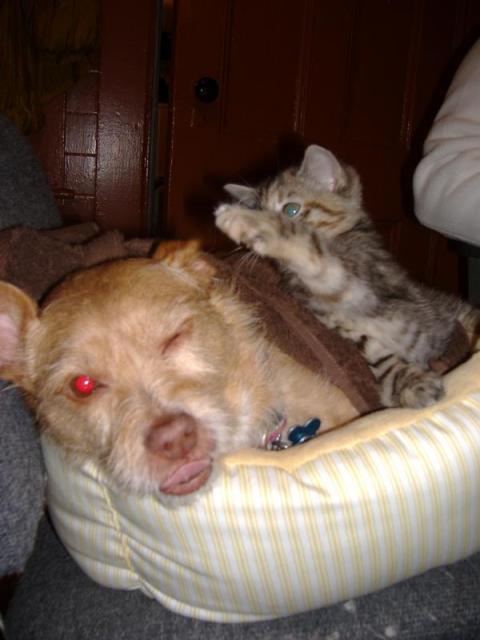 My dog is shaking and hiding under my bed recently
QuestionRorrie and Pencil
QUESTION: My dog, Rorr
My dog is shaking and hiding under my bed recently
QuestionRorrie and Pencil
QUESTION: My dog, Rorr
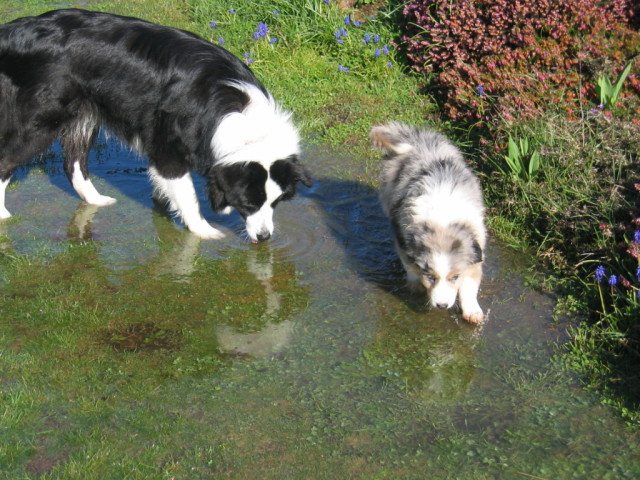 Dog in Heat?
QuestionLily and Jorge
QUESTION: Hello,
We have
Dog in Heat?
QuestionLily and Jorge
QUESTION: Hello,
We have
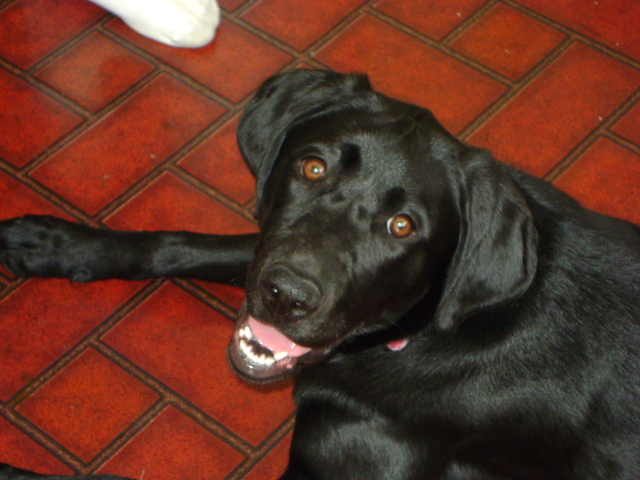 Black lab - 1 yr
QuestionSheba
QUESTION: My lab loves to bite her
Black lab - 1 yr
QuestionSheba
QUESTION: My lab loves to bite her
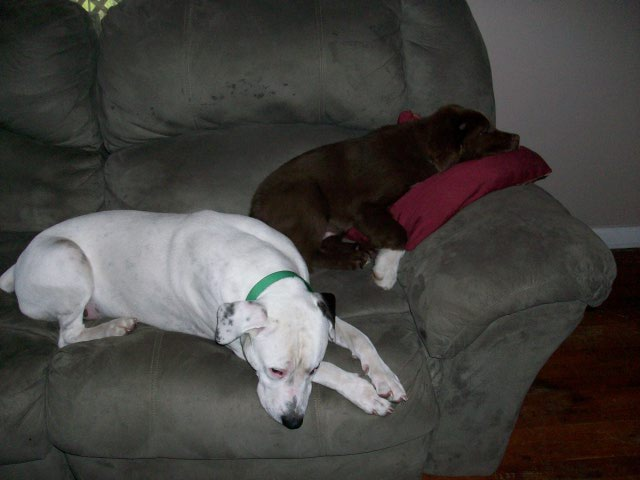 American Bulldog aggression
Question
Buddy and Rez
I have a 2 year old Ameri
American Bulldog aggression
Question
Buddy and Rez
I have a 2 year old Ameri